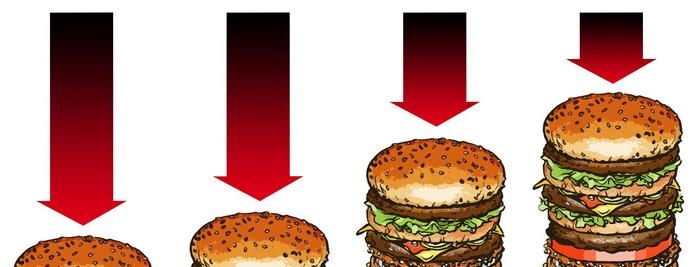Where does food breakdown begin? |
|
Past times were characterized by hyperdynamia - high physical activity and mobility. Now we are more and more encountering the opposite phenomenon - physical inactivity, manifested in low mobility, a sedentary lifestyle. Inactivity and the "muscle hunger" caused by it sooner or later lead to adverse consequences and, above all, to disruption of metabolic processes and the entire life of the body. This cannot but affect the neuropsychic sphere, in which various disorders begin to arise. They often become persistent and extremely difficult to treat. Our attitude to food has also changed. The centuries-old nutritional deficiency up to massive epidemics of hunger has been replaced in recent decades by hyperphagia (overeating). In view of the excessive assimilation of energy substances (calories) by the body, which occurs as a result of systematic overeating, energy consumption is increasingly reduced. This process involves not only biological, but also psychological mechanisms. People prone to overeating, over time, begin to increasingly resort to food when the body does not require it. They are drawn to "have a snack" in the absence of hunger. It is known, for example, that overweight people eat more often, even when there is no need for food, and unlike thin people, they are deprived of the opportunity to accurately differentiate both the feeling of hunger and the feeling of satiety. And the last constituent element of the triad is hyperpsychia. This refers to the increased requirements for the internal reserves of the psyche, the constant overloads experienced by a person due to the abundance of information flow, which has reached an unprecedented volume especially now, during the period of the scientific and technological revolution.
Neurosis often develops against the background of a weakening of the nervous system, which is a consequence of physical and mental fatigue, an infectious process (flu, tonsillitis, pneumonia, etc.), a long-term illness of internal organs. Various age-related ailments can also contribute to the weakening of the nervous system. All kinds of mental trauma in personal, family or social life also play a role in the emergence of neurosis. At the same time, the attitude of others is very important. A person with a weakened nervous system is especially sensitive to the effects of external factors (a common remark, completely harmless, can throw him off balance), he reacts to them more sharply. Injury, vulnerability are the first signs of weakening, exhaustion of the nervous system. The immediate provoking cause of neurosis can be both one-time very strong mental trauma, and weaker, but long-acting. The latter, summing up, also lead to the development of neurosis. In some cases, we are talking about acute traumatic situations and acute psychotrauma. These include most often events that sharply violate or threaten to disrupt our entire usual way of life: death of loved ones, serious illness, troubles at work, family conflict, failures in personal relationships (disappointment in a friend, break with a loved one).In other cases, we are talking about a chronic psycho-traumatic situation that has existed for a long time. It is rather difficult to enumerate all their options, since any event that keeps us in a state of tension for a long time or causes unpleasant, oppressive experiences can be attributed to this category. Often a verbal stimulus is the "starting" moment in the emergence of a neurosis. Suffice it to say that under the influence of the words heard or read, a person blushes or turns pale, the heartbeat speeds up or slows down, breathing changes its rhythm, etc. The word contains directly opposite charges: it can heal, but it can also cause illness. It is impossible not to recall the saying of the ancient Greek fabulist Aesop: "Our language is the best and worst that exists in the whole world." And here is what an old eastern proverb says: "A wound from a spear is treatable, but a wound from a word is incurable." The strength of the traumatic effect of a word is determined by the significance of information for a person, i.e., as experts say, it depends not on the quantitative, but on the semantic side of the message. So, a mockery about appearance for one turns out to be a severe mental trauma, for another - a trifle to which he does not pay any attention. Or, for example, a neurosis can develop in a person at the sight of a fire that destroys his property. At the same time, the painful condition is caused not by the intensity of light, not by the thermal effect of heat rays, but by the information that is carried by the appearance of flaming furniture, things, objects dear to a person, etc. In contrast, a burn upon close contact with a flame occurs regardless of the informational significance of what is happening. For understanding the mechanism of action of mental trauma, the concept of probabilistic forecasting provides a lot of value. What is it? Experimental data show that in the brain there is a process of comparing the actual situation and the one that we expect. This is very important as it allows you to prepare for upcoming events. So, a swallow hunting for an insect does not catch up with it, repeating the path of its flight, but strives across the path - not to the insect, but to a certain point in space, where (in accordance with its past experience) it will most likely find itself simultaneously with the insect. Any unexpected change in the situation leads to a mismatch between the expected and the occurred event. The greater this discrepancy, the more likely the possibility of a nervous breakdown.
Everything that in one way or another affects his future is very significant for a person. He is faced with the need to make a decision: what to do in the future? Depending on what decision he comes to, his fate may turn out in different ways. Until a person has chosen some line of behavior and began to act in accordance with it, he has tension, anxiety, and anxiety. The situation in which he finds himself continues to have a disease-causing effect on him. ... A man is sitting at the reception in the clinic. He has had a stomach ulcer for a long time. For a long time, he was treated with varying success. Doctors recommended surgical intervention. But he hesitates, knowing full well that this is necessary to get rid of the disease, but at the same time he is afraid of the upcoming operation. For 2 months, he has not been able to make any final decision. He began to sleep worse, became irritable, irascible, decreased efficiency. It became difficult to communicate with him, since all conversations invariably boil down to one question: to be operated on or not? There are obvious manifestations of neurosis.Finally, one very reputable specialist strongly recommended surgery. And a strange thing: it would seem that anxiety and anxiety should increase. And a person feels differently. He became calmer and his sleep improved. The key is that now he knows for sure that the operation awaits him. The psycho-traumatic factor loses its significance, as a result of which neurotic symptoms decrease and then disappear. For most people, mental trauma is not something that is directed to the past, but something that poses a threat to the future, prompting to look for some way out, some specific line of behavior. If a neurosis is a painful reaction, for example, to the death of someone close to you, then the traumatic effect of what happened is important in the light of the future. A person mourns and experiences not so much the fact of loss as his future fate: “How am I going to live now? Who are you leaving me for? " And the comforting ones, as a rule, involuntarily suggest the prospect of a way out of this situation: "You have children who need you, for whom you must live ..." and so on. Often, a conflict situation that is insoluble for a given person leads to the development of a disease. One of our patients developed neurosis due to the fact that within six months the question of whether he would develop a topic at the institute of which he was a research assistant, or he would have to go on a long business trip to one of the factories of the country, was not resolved. Every month the management made one or the other decision, and this employee was forced to change his plans again and again, to rebuild the research program. Such long-term uncertainty of the situation, causing a state of persistent emotional stress, often serves as an impetus for the emergence of neurosis. This is especially clear in those cases when events that are important for a person change in one direction or the other, which does not allow him to choose some firm position, knocks him out of the rut, as was the case with our patient.
Based on my clinical experience, I can say that events leading to a complex internal struggle of conflicting aspirations are very traumatic for a person. So, one woman I know had a neurosis after she learned about her husband's betrayal. She could not forgive him for betrayal and was going to file a divorce, but at the same time she was not able to decide on this step, as she understood the need to preserve the family for the sake of children. Forced living together with a person for whom you feel nothing but hostility, the need to stay in an unfavorable situation against your will, doing some business that does not correspond to the person's beliefs and principles, the child's love and hatred for an alcoholic father - these are examples of internal conflicts between duty and feeling, often contributing to the development of neurosis. Exposure to psychogenic factors can be acute or chronic. Many troubles that for the time being did not lead to painful reactions, as it were, accumulate and gradually prepare a nervous breakdown by the mechanism of the "overflowing bowl". A common cause of breakdowns is psychotrauma received in early childhood. The loss or illness of loved ones, quarrels or divorce of parents cause changes in the mental state of children.The fact that for adults is a factor that does not deserve attention, for a child with his still not strengthened nervous system plays the role of a serious mental trauma that leaves a mark for many years. Under certain conditions, this mental trauma already in adulthood can "sound" again and cause the development of neurosis. Tarnavsky Yu.B. |
| The structure and chemical composition of vegetables and fruits |
|---|
New recipes
 The possibilities for maintaining neuropsychic health in humans are quite large. And yet, under the influence of a number of unfavorable factors, they can decrease to one degree or another. Most of all, according to scientists, the following three circumstances contribute to this: hypodynamia, hyperphagia and hyperpsychia.
The possibilities for maintaining neuropsychic health in humans are quite large. And yet, under the influence of a number of unfavorable factors, they can decrease to one degree or another. Most of all, according to scientists, the following three circumstances contribute to this: hypodynamia, hyperphagia and hyperpsychia. Of course, the described triad does not exhaust the causes of neurosis. There are a lot of these reasons. Let us name some of them, the most significant.
Of course, the described triad does not exhaust the causes of neurosis. There are a lot of these reasons. Let us name some of them, the most significant. Expectation of an unpleasant event, attempts to predict its consequences can sometimes cause even more nervous tension and anxiety than the event itself. The situation of uncertainty, ignorance, uncertainty - these moments very often contribute to the "collision" of nervous processes.
Expectation of an unpleasant event, attempts to predict its consequences can sometimes cause even more nervous tension and anxiety than the event itself. The situation of uncertainty, ignorance, uncertainty - these moments very often contribute to the "collision" of nervous processes. The development of neurosis can also be facilitated by the long-term affective-saturated representations, which once had a strong influence on the human psyche. They create a kind of "sore point" in the cerebral cortex. And all the traumatic moments related to such a "sore point" are experienced especially acutely. So, if a person in the past had a long family conflict that led to a neurotic breakdown, then in the future everything that is somehow connected with it will be experienced especially painfully and have a negative impact.
The development of neurosis can also be facilitated by the long-term affective-saturated representations, which once had a strong influence on the human psyche. They create a kind of "sore point" in the cerebral cortex. And all the traumatic moments related to such a "sore point" are experienced especially acutely. So, if a person in the past had a long family conflict that led to a neurotic breakdown, then in the future everything that is somehow connected with it will be experienced especially painfully and have a negative impact.









